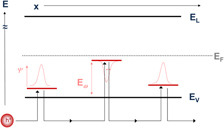Crossref Citations
This article has been cited by the following publications. This list is generated based on data provided by
Crossref.
Krebs, Daniel
Bachmann, Tobias
Jonnalagadda, Prasad
Dellmann, Laurent
and
Raoux, Simone
2014.
Changes in electrical transport and density of states of phase change materials upon resistance drift.
New Journal of Physics,
Vol. 16,
Issue. 4,
p.
043015.
Luckas, Jennifer
Longeaud, Christophe
and
Siebentritt, Susanne
2014.
Modulated photocurrent experiments-comparison of different data treatments.
Journal of Applied Physics,
Vol. 116,
Issue. 10,
Yu, X.
and
Robertson, J.
2014.
Nature of gap states in GeSbTe phase change memory materials.
Canadian Journal of Physics,
Vol. 92,
Issue. 7/8,
p.
671.
Luckas, J.
Olk, A.
Jost, P.
Volker, H.
Alvarez, J.
Jaffré, A.
Zalden, P.
Piarristeguy, A.
Pradel, A.
Longeaud, C.
and
Wuttig, M.
2014.
Impact of Maxwell rigidity transitions on resistance drift phenomena in GexTe1−x glasses.
Applied Physics Letters,
Vol. 105,
Issue. 9,
Saito, Yuta
Shindo, Satoshi
Sutou, Yuji
and
Koike, Junichi
2014.
Chronological change of electrical resistance in GeCu2Te3amorphous film induced by surface oxidation.
Journal of Physics D: Applied Physics,
Vol. 47,
Issue. 47,
p.
475302.
Luckas, Jennifer
Longeaud, Christophe
Bertram, Tobias
and
Siebentritt, Susanne
2014.
Metastable defect in CuInSe2 probed by modulated photo current experiments above 390 K.
Applied Physics Letters,
Vol. 104,
Issue. 15,
Avila, L.F.
Pradel, A.
Ribeiro, S.J.L.
Messaddeq, Y.
and
Nalin, M.
2015.
Laser irradiation and thermal treatment inducing selective crystallization in Sb2O3–Sb2S3 glassy films.
Physica B: Condensed Matter,
Vol. 458,
Issue. ,
p.
67.
Raty, Jean Yves
Zhang, Wei
Luckas, Jennifer
Chen, Chao
Mazzarello, Riccardo
Bichara, Christophe
and
Wuttig, Matthias
2015.
Aging mechanisms in amorphous phase-change materials.
Nature Communications,
Vol. 6,
Issue. 1,
Rütten, Martin
Kaes, Matthias
Albert, Andreas
Wuttig, Matthias
and
Salinga, Martin
2015.
Relation between bandgap and resistance drift in amorphous phase change materials.
Scientific Reports,
Vol. 5,
Issue. 1,
Champlain, James G.
Ruppalt, Laura B.
Guyette, Andrew C.
El-Hinnawy, Nabil
Borodulin, Pavel
Jones, Evan
Young, Robert M.
and
Nichols, Doyle
2016.
Examination of the temperature dependent electronic behavior of GeTe for switching applications.
Journal of Applied Physics,
Vol. 119,
Issue. 24,
Zipoli, Federico
Krebs, Daniel
and
Curioni, Alessandro
2016.
Structural origin of resistance drift in amorphous GeTe.
Physical Review B,
Vol. 93,
Issue. 11,
Podpirka, Adrian
Lee, Woo-Kyung
Ziegler, Jed I.
Brintlinger, Todd H.
Felts, Jonathan R.
Simpkins, Blake S.
Bassim, Nabil D.
Laracuente, Arnaldo R.
Sheehan, Paul E.
and
Ruppalt, Laura B.
2017.
Nanopatterning of GeTe phase change films via heated-probe lithography.
Nanoscale,
Vol. 9,
Issue. 25,
p.
8815.
Sandhu, Sharanjit
Kumar, S.
and
Thangaraj, R.
2017.
Study of aluminium-modified Ge2Sb2Te5thin films for the applicability as phase-change storage device material.
Phase Transitions,
Vol. 90,
Issue. 10,
p.
1013.
Verdy, Anthonin
Navarro, Gabriele
Bernard, Mathieu
Noe, Pierre
Bourgeois, Guillaume
Garrione, Julien
Cyrille, Marie-Claire
Sousa, Veronique
and
Nowak, Etienne
2018.
High Temperature Stability and Performance Analysis of N-doped Ge-Se-Sb Based OTS Selector Devices.
p.
1.
Li, Chao
Hu, Chaoquan
Wang, Jianbo
Yu, Xiao
Yang, Zhongbo
Liu, Jian
Li, Yuankai
Bi, Chaobin
Zhou, Xilin
and
Zheng, Weitao
2018.
Understanding phase-change materials with unexpectedly low resistance drift for phase-change memories.
Journal of Materials Chemistry C,
Vol. 6,
Issue. 13,
p.
3387.
Yoo, Sijung
Yoo, Chanyoung
Park, Eui-Sang
Kim, Woohyun
Lee, Yoon Kyeung
and
Hwang, Cheol Seong
2018.
Chemical interactions in the atomic layer deposition of Ge–Sb–Se–Te films and their ovonic threshold switching behavior.
Journal of Materials Chemistry C,
Vol. 6,
Issue. 18,
p.
5025.
Sahu, Smriti
Manivannan, Anbarasu
and
Deshpande, Uday Prabhakarrao
2018.
A systematic evolution of optical band gap and local ordering in Ge1Sb2Te4 and Ge2Sb2Te5 materials revealed by in situ optical spectroscopy.
Journal of Physics D: Applied Physics,
Vol. 51,
Issue. 37,
p.
375104.
Srivastava, Ankita
and
Mehta, Neeraj
2018.
Enhancement of polaron-hopping-based a.c. conduction in semiconducting STS (Se–Te–Sn) glass by silver incorporation.
Dalton Transactions,
Vol. 47,
Issue. 30,
p.
10187.
Guo, Yuzheng
Li, Huanglong
Zhang, Wei
and
Robertson, John
2019.
Structural changes during the switching transition of chalcogenide selector devices.
Applied Physics Letters,
Vol. 115,
Issue. 16,
Konstantinou, Konstantinos
Mocanu, Felix C.
Lee, Tae-Hoon
and
Elliott, Stephen R.
2019.
Revealing the intrinsic nature of the mid-gap defects in amorphous Ge2Sb2Te5.
Nature Communications,
Vol. 10,
Issue. 1,



